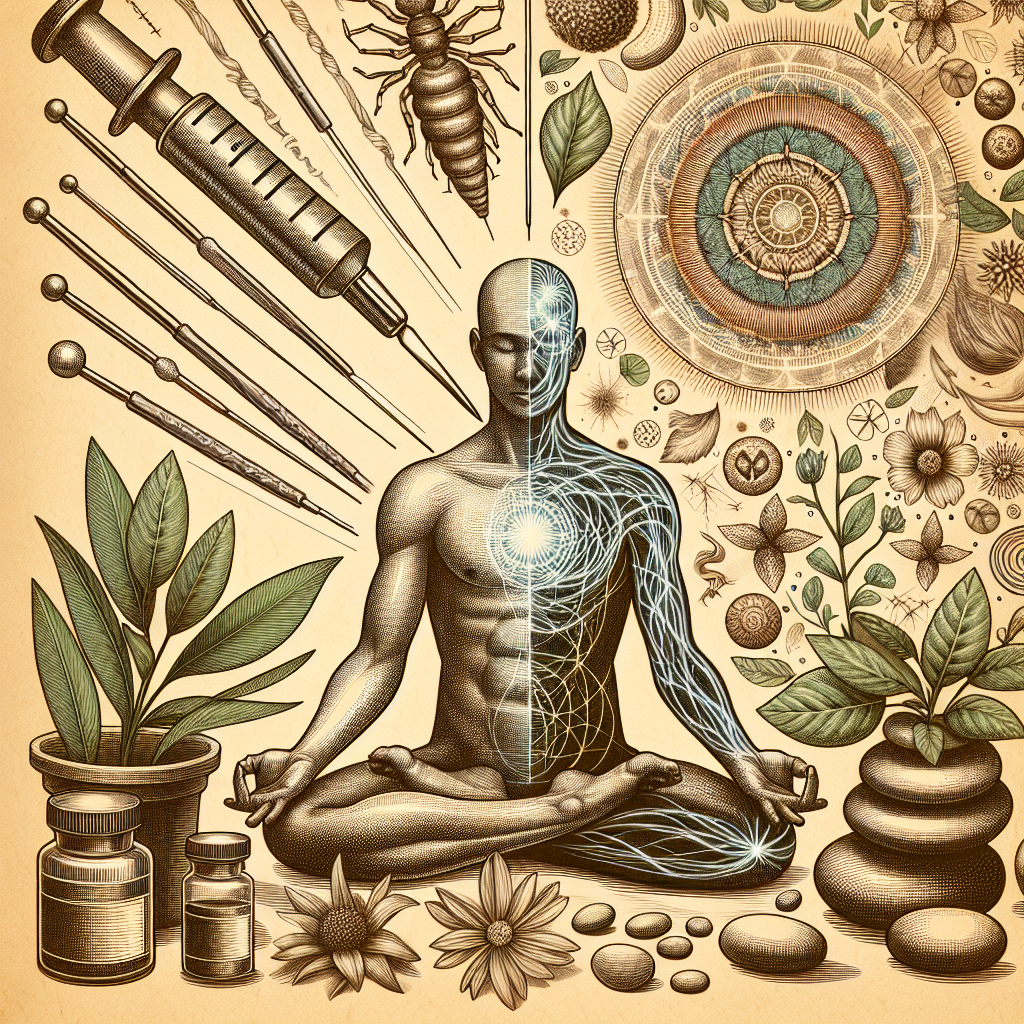Imagine a world where health and well-being are approached from a holistic perspective. A world where the body, mind, and spirit are all interconnected, and healing is not just limited to treating symptoms, but encompasses the entire being. This is the concept of holistic medicine. In this article, we will explore and uncover the principles and benefits of this alternative approach to healthcare. So, get ready to broaden your horizons and embark on a journey of understanding the fascinating world of holistic medicine.
What is holistic medicine?
Definition of holistic medicine
Holistic medicine is an approach to healthcare that considers the entire person — their physical, emotional, mental, and spiritual well-being — in the pursuit of optimal health. It recognizes that all aspects of a person’s life are interconnected and seeks to address imbalances or disharmony in order to promote overall wellness.
Principles of holistic medicine
At the core of holistic medicine are several guiding principles. These principles include treating the whole person, focusing on the root cause of health issues rather than just addressing symptoms, promoting prevention and self-care, considering all aspects of health, and integrating conventional and alternative therapies.
Origins of holistic medicine
The origins of holistic medicine can be traced back to ancient healing traditions in various cultures, such as Chinese medicine, Ayurveda, and Indigenous healing practices. These traditional systems of medicine have long recognized the importance of interconnectedness between mind, body, and spirit in achieving optimal health.
Scope of holistic medicine
Holistic medicine encompasses a wide range of healthcare practices and therapies. It includes approaches such as nutrition and diet, herbal medicine, acupuncture, massage therapy, chiropractic care, meditation and mindfulness, energy healing, exercise and physical activity, stress management techniques, and more. By taking a comprehensive and integrative approach, holistic medicine aims to address the diverse needs of individuals seeking care.
Benefits of holistic medicine
Comprehensive approach to health
One of the key benefits of holistic medicine is its comprehensive approach to health. Rather than focusing solely on physical symptoms, holistic medicine considers the interplay between various factors that contribute to well-being, including mental, emotional, and spiritual aspects. By addressing the whole person, holistic medicine is able to provide a more holistic understanding of health and offer comprehensive treatment plans.
Individualized treatment
Another advantage of holistic medicine is its emphasis on individualized treatment. Recognizing that each person is unique, holistic practitioners take into account a person’s specific needs, preferences, and circumstances when developing treatment plans. This personalized approach ensures that the care provided is tailored specifically to the individual, enhancing the likelihood of positive outcomes.
Promotes overall well-being
Holistic medicine goes beyond merely treating symptoms or managing illnesses; it aims to promote overall well-being. By considering all aspects of a person’s life and health, holistic medicine seeks to enhance not only physical health but also mental, emotional, and spiritual well-being. This focus on the overall well-being of an individual contributes to a higher quality of life and a greater sense of vitality.
Preventive care
In addition to addressing existing health issues, holistic medicine places a strong emphasis on preventive care. By identifying and addressing potential risk factors, imbalances, or vulnerabilities early on, holistic medicine seeks to prevent the development of diseases or conditions. This proactive approach to health can lead to better long-term outcomes and reduce the need for more invasive or aggressive interventions down the line.
Reduction of side effects
Another benefit of holistic medicine is its potential to reduce the occurrence and severity of side effects associated with certain treatments or medications. By utilizing a range of therapies and modalities, holistic medicine aims to minimize negative impacts on the body and optimize positive outcomes. This can be particularly beneficial for individuals who may be sensitive to certain medications or who have experienced adverse effects from conventional treatments.
Integration of conventional and alternative therapies
Holistic medicine promotes the integration of both conventional and alternative therapies. Rather than viewing them as separate entities, holistic medicine recognizes that each approach has its own strengths and limitations. By combining the best of both worlds, holistic medicine seeks to create a cohesive and synergistic approach to healthcare. This integration allows for a broader range of treatment options and greater flexibility in meeting the diverse needs of individuals.

Key concepts in holistic medicine
Mind-body connection
One key concept in holistic medicine is the recognition of the mind-body connection. This concept acknowledges that the state of the mind can significantly impact physical health, and vice versa. Holistic medicine recognizes that addressing mental and emotional well-being is crucial for promoting optimal physical health. Therapies such as meditation, mindfulness practices, and counseling are often used to nurture this mind-body connection.
Individualized treatment plans
Holistic medicine emphasizes the importance of individualized treatment plans. Recognizing that each person has unique needs and circumstances, holistic practitioners take the time to develop personalized treatment plans that address the specific health concerns of each individual. This tailored approach ensures that the treatment is better aligned with the individual’s goals, preferences, and overall well-being.
Focusing on the root cause
Rather than solely addressing symptoms, holistic medicine seeks to identify and address the underlying root causes of health issues. By treating the root cause, holistic medicine aims to bring about long-lasting healing and prevent the recurrence of symptoms. This comprehensive approach to diagnosis and treatment allows for a more thorough and effective management of health conditions.
Prevention and self-care
Holistic medicine places a strong emphasis on prevention and self-care. Practitioners educate and empower individuals to take an active role in maintaining their own health and well-being. This may involve lifestyle changes, such as adopting a nutritious diet, engaging in regular exercise, getting enough sleep, and managing stress effectively. By focusing on prevention and self-care, holistic medicine aims to support individuals in achieving optimal health and reducing the risk of diseases or conditions.
Considering all aspects of health
Holistic medicine takes a holistic view of health by considering all aspects that contribute to well-being. This includes not only physical health but also mental, emotional, and spiritual well-being. By addressing these various dimensions, holistic medicine aims to create a more complete and comprehensive understanding of an individual’s health. By considering all aspects of health, holistic medicine can provide a more well-rounded and effective approach to healthcare.
Practices and techniques in holistic medicine
Nutrition and diet
Nutrition and diet play a crucial role in holistic medicine. Holistic practitioners recognize the impact of food on overall health and well-being, and they emphasize the use of whole, nutrient-dense foods to support optimal health. They may provide guidance on dietary choices, meal planning, and supplementation to address specific health concerns or imbalances.
Herbal medicine
Herbal medicine is another commonly used practice in holistic medicine. Herbs and botanical remedies are used to support the body’s natural healing mechanisms and restore balance. Holistic practitioners may recommend specific herbs or herbal preparations to address various health issues or as part of a overall wellness plan.
Acupuncture
Acupuncture is an ancient Chinese practice that involves the insertion of thin needles into specific points on the body. This technique is used to stimulate and balance the flow of energy, known as Qi, throughout the body. Acupuncture is often employed to alleviate pain, reduce inflammation, and promote overall well-being.
Massage therapy
Massage therapy is a popular practice that is integrated into holistic medicine. It involves the manipulation of soft tissues to improve circulation, relieve tension, and promote relaxation. Massage therapy can be used to address specific musculoskeletal issues, promote stress reduction, and enhance overall well-being.
Chiropractic care
Chiropractic care focuses on the diagnosis, treatment, and prevention of disorders of the musculoskeletal system, particularly the spine. Chiropractors use manual adjustments and other techniques to align the spine and promote proper nervous system function. It is often employed to alleviate back pain, improve mobility, and restore overall balance in the body.
Meditation and mindfulness
Meditation and mindfulness practices are commonly utilized in holistic medicine to promote relaxation, reduce stress, and enhance mental well-being. These practices involve focusing one’s attention, cultivating awareness, and fostering a sense of presence in the present moment. Regular meditation and mindfulness practice can have numerous benefits for both physical and mental health.
Energy healing
Energy healing encompasses various practices that aim to activate and balance the body’s subtle energy systems. These practices include Reiki, Qigong, and Healing Touch, among others. Energy healing is based on the belief that imbalances or blockages in the body’s energy can contribute to illness or disease. By clearing, balancing, and replenishing the body’s energy, energy healing can support overall health and well-being.
Exercise and physical activity
Physical activity and exercise are key components of holistic medicine. Regular exercise helps to improve cardiovascular health, strengthen muscles and bones, support healthy weight management, and boost overall well-being. Holistic practitioners emphasize finding enjoyable and sustainable forms of exercise that align with an individual’s preferences and physical capabilities.
Stress management techniques
Stress management techniques are an important part of holistic medicine. Chronic stress can have detrimental effects on both physical and mental health. Holistic practitioners may utilize various techniques such as deep breathing exercises, relaxation techniques, yoga, and stress reduction strategies to help individuals effectively manage and reduce stress levels.

Holistic approach to mental health
Addressing psychological and emotional factors
Holistic medicine recognizes the important role of psychological and emotional factors in overall health and well-being. Mental health concerns such as anxiety, depression, trauma, and stress can all impact a person’s physical health. Holistic practitioners address these factors by providing counseling, therapy, and support to help individuals navigate and overcome these challenges.
Integrating therapy and counseling
To provide comprehensive care, holistic medicine often integrates therapy and counseling into treatment plans. Traditional talk therapy, cognitive-behavioral therapy, and other therapeutic modalities may be used to address underlying mental health issues and support overall well-being. The integration of therapy helps individuals gain insights, develop coping strategies, and promote emotional healing.
Promoting relaxation and stress reduction
Relaxation and stress reduction techniques are essential in the holistic approach to mental health. Holistic medicine emphasizes the importance of creating time and space for relaxation and self-care. This may involve incorporating practices such as meditation, deep breathing exercises, mindfulness, and relaxation techniques into daily routines to help manage stress levels and promote mental well-being.
Incorporating mindfulness practices
Mindfulness practices are central to holistic medicine’s approach to mental health. Mindfulness involves intentionally bringing one’s attention to the present moment, without judgment. It can help individuals cultivate self-awareness, reduce rumination, and increase overall well-being. Mindfulness practices may include meditation, mindful eating, walking meditation, or body scan exercises.
Supporting overall mental well-being
Holistic medicine places a strong emphasis on supporting overall mental well-being. This includes fostering a positive mindset, developing healthy coping strategies, promoting self-compassion, and enhancing resilience. Holistic practitioners work with individuals to identify areas of mental well-being that may need attention, and then develop strategies to support and enhance those areas.
Common misconceptions about holistic medicine
Holistic medicine is a replacement for conventional medicine
One common misconception about holistic medicine is that it is a complete replacement for conventional medicine. In reality, holistic medicine is an approach that complements and integrates with conventional medical practices. While holistic medicine may offer alternative therapies, it does not advocate for the complete abandonment of conventional treatments. Instead, it seeks to provide additional modalities that can support and enhance overall health and well-being.
Holistic medicine lacks scientific evidence
Another misconception is that holistic medicine lacks scientific evidence to support its efficacy. While it is true that some alternative therapies may have limited research backing, many holistic practices, such as nutrition, exercise, and stress reduction techniques, have a solid scientific foundation. Furthermore, research in the field of holistic medicine is growing, and there is increasing recognition of the value of integrative approaches in healthcare.
Holistic medicine is only for alternative therapy enthusiasts
Holistic medicine is often mistakenly associated with individuals who exclusively seek alternative therapies and approaches to healthcare. However, holistic medicine can benefit anyone, regardless of their beliefs or preferences. Its focus on the whole person and individualized care makes it relevant for individuals who desire a more comprehensive approach to health and well-being.
Holistic medicine is time-consuming and expensive
There is a common misconception that holistic medicine is time-consuming and costly. While some holistic treatments and therapies may require more time or financial investment, others can be easily incorporated into everyday life. Additionally, the preventive focus of holistic medicine can help individuals avoid more costly and time-consuming interventions in the long run. Holistic medicine is adaptable and can be tailored to fit the needs and resources of each individual.

Training and qualifications in holistic medicine
Medical doctors and holistic medicine
Medical doctors can incorporate holistic medicine into their practice by pursuing additional training and specialization in integrative medicine. They may choose to attend specialized programs or pursue certifications in holistic medicine to expand their knowledge and skills. This additional training allows medical doctors to provide a more comprehensive and integrative approach to healthcare.
Holistic practitioners and their training
Holistic practitioners encompass a diverse range of healthcare providers who focus on holistic approaches. These may include naturopathic doctors, chiropractors, acupuncturists, herbalists, and various other professionals. Each type of practitioner has its own specific training and requirements, which may vary depending on the country or region. Holistic practitioners often undergo rigorous training in their respective fields to ensure competency and expertise.
Certification and accreditation in holistic medicine
Certification and accreditation in holistic medicine help establish standards of practice and ensure quality care. Organizations such as the American Board of Integrative Medicine and the International Society for Complementary Medicine Research provide certifications for healthcare providers who specialize in holistic medicine. Accreditation for educational institutions, such as naturopathic medical schools, helps uphold standards in training and education.
Continuing education and professional development
Holistic medicine is a rapidly evolving field, and ongoing education and professional development are crucial for practitioners to stay informed and up to date. Many holistic medicine organizations offer continuing education courses and conferences that allow practitioners to expand their knowledge, learn about new research and developments, and refine their skills. This commitment to lifelong learning helps ensure that holistic medicine practitioners provide high-quality care.
Criticism and controversies surrounding holistic medicine
Lack of regulation and standardization
One criticism of holistic medicine is the lack of regulation and standardization within the field. Unlike conventional medicine, which has clear guidelines and regulatory bodies, holistic medicine is often less standardized. This lack of regulation can make it challenging for individuals to identify qualified practitioners and can sometimes result in inconsistent quality of care.
Potential risks and safety concerns
While many holistic practices are safe and effective, there can be potential risks and safety concerns associated with certain therapies or treatments. For example, some herbal remedies may interact with medications, and certain alternative therapies may carry risks if performed by unqualified practitioners. It is important for individuals to work with trained professionals and inform their healthcare providers about any holistic treatments they are undergoing.
Resistance from medical establishment
Holistic medicine has faced resistance and skepticism from the conventional medical establishment. Some healthcare professionals question the scientific basis and evidence supporting certain holistic practices, which can create barriers to collaboration and integration. However, as the field of holistic medicine continues to grow and research in integrative approaches expands, there is increasing recognition of the value and potential benefits of working together.
Integration challenges
Integrating holistic medicine into conventional healthcare systems can present challenges. These challenges include issues related to reimbursement, standardization of protocols, and coordination of care. As more research supports the effectiveness of holistic approaches and as patients increasingly seek integrative care, efforts are being made to address these challenges and facilitate greater collaboration between different healthcare modalities.

Case studies and research on holistic medicine
Successful application of holistic medicine in chronic disease management
Numerous case studies have demonstrated the successful application of holistic medicine in managing chronic diseases. For example, integrative approaches that combine conventional therapies with diet and lifestyle modifications have been effective in managing conditions such as diabetes, cardiovascular disease, and autoimmune disorders. These case studies highlight the potential benefits of taking a comprehensive and multifaceted approach to chronic disease management.
Patient satisfaction and outcomes
Studies have shown that patients who receive holistic care often report higher levels of satisfaction and improved outcomes compared to those receiving only conventional care. This could be attributed to the personalized and comprehensive approach of holistic medicine, which considers all aspects of health and tailors treatment plans to individual needs. Patient satisfaction and positive outcomes are important indicators of the value and effectiveness of holistic medicine.
Research evidence supporting holistic medicine
Research in the field of holistic medicine is growing, and there is an increasing body of evidence supporting the effectiveness of certain holistic practices. Numerous studies have demonstrated the benefits of nutrition, exercise, stress reduction techniques, and mindfulness practices in promoting health and well-being. Additionally, some alternative therapies, such as acupuncture and herbal medicine, have been shown to have positive effects in certain health conditions. However, more research is needed to further strengthen the evidence base and address any existing gaps.
Limitations and gaps in research
While there is growing research evidence supporting holistic medicine, there are still limitations and gaps in the existing body of knowledge. Many studies in the field of holistic medicine are small-scale and lack robust methodologies. Furthermore, research on certain holistic practices or their specific effects may be limited. Addressing these limitations and conducting more rigorous research will help further validate the effectiveness of holistic medicine and guide clinical decision-making.
Integrating holistic medicine with conventional healthcare
Collaborative healthcare models
To facilitate the integration of holistic medicine with conventional healthcare, collaborative healthcare models have emerged. These models involve interdisciplinary collaboration among healthcare providers from various backgrounds, including conventional medicine, integrative medicine, and holistic practices. Collaborative models promote communication, coordination of care, and shared decision-making, all with the goal of providing the best possible care for individuals.
Holistic medicine in hospitals and clinics
Holistic medicine is increasingly being integrated into hospitals and clinics, allowing individuals to access a range of healthcare options. Some healthcare institutions have dedicated integrative medicine departments or offer holistic services alongside conventional treatments. This integration helps ensure that individuals have a comprehensive and coordinated approach to their care and enhances access to holistic medicine for a wider population.
Education and awareness for healthcare providers
Education and awareness play a crucial role in integrating holistic medicine with conventional healthcare. Healthcare providers, including doctors, nurses, and other allied health professionals, can benefit from continuing education and training in holistic practices. This enables them to have a better understanding of holistic approaches and facilitates collaboration and communication with holistic practitioners. Enhancing education and awareness can also contribute to overcoming any skepticism or resistance towards holistic medicine.
Policy and insurance considerations
To fully integrate holistic medicine into conventional healthcare, policy and insurance considerations are important. Regulatory bodies and policymakers can play a role in establishing guidelines, standards, and regulations for holistic practices, ensuring the safety and quality of care. Additionally, insurance coverage for holistic treatments can make them more accessible to individuals seeking holistic care. Addressing policy and insurance considerations can help create a more supportive environment for the integration of holistic medicine with conventional healthcare.
In summary, holistic medicine is an approach to healthcare that considers the whole person and aims to promote optimal health and well-being. It encompasses a wide range of practices and therapies, including nutrition, herbal medicine, acupuncture, massage therapy, meditation, and more. Holistic medicine takes into account the mind-body connection, focuses on individualized treatment plans, addresses root causes, emphasizes prevention and self-care, and considers all aspects of health. It offers numerous benefits, including comprehensive care, individualized treatment, promotion of overall well-being, preventive care, reduction of side effects, and integration of conventional and alternative therapies. However, there are common misconceptions, criticism, and challenges surrounding holistic medicine, such as lack of regulation, skepticism, and integration issues. Research evidence supporting holistic medicine is growing, but there are still limitations and gaps in the existing body of knowledge. Integrating holistic medicine with conventional healthcare requires collaborative healthcare models, integration in hospitals and clinics, education and awareness for healthcare providers, and policy and insurance considerations. By embracing a holistic approach, individuals can achieve comprehensive, personalized, and empowering healthcare that supports their overall well-being.

